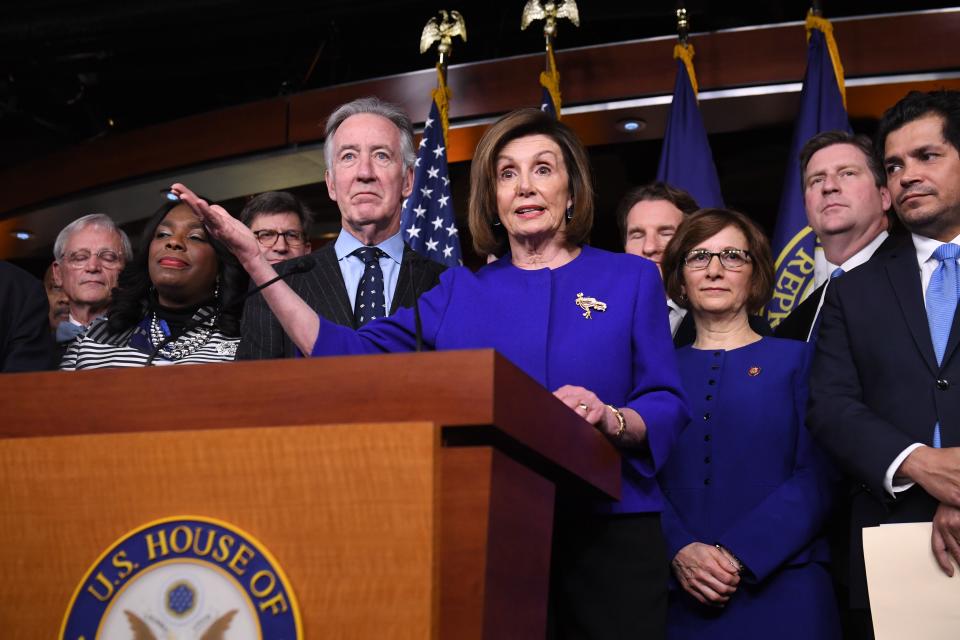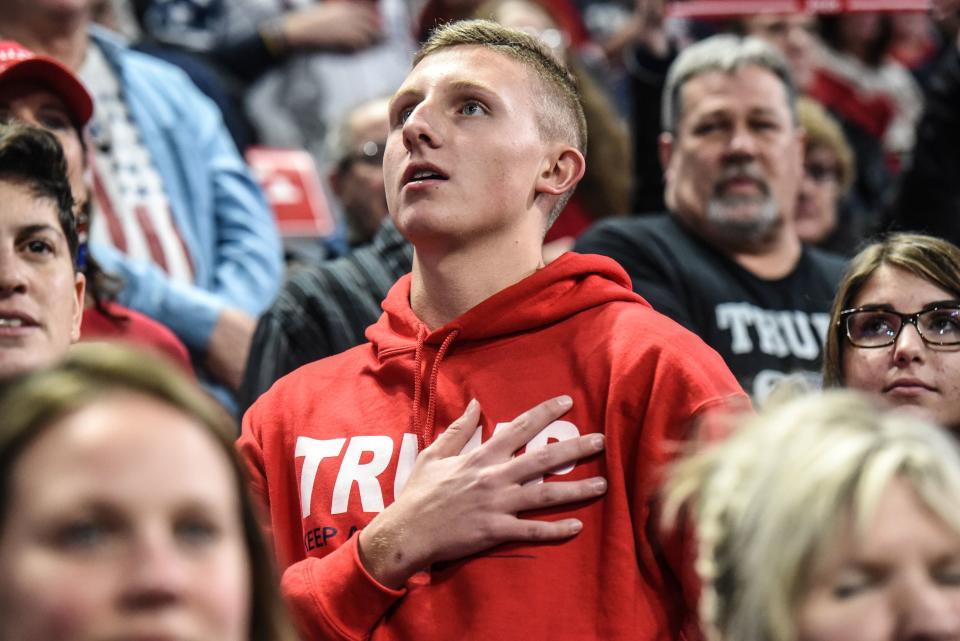Did Democrats just help Trump win reelection?
Welcome to 2020 Vision, the Yahoo News column covering the presidential race with one key takeaway every weekday and a wrap-up each weekend. Reminder: There are 54 days until the Iowa caucuses and 328 days until the 2020 election.
The headline in Politico, the leading tribune of inside-the-Beltway conventional wisdom, was stark: “Dems fret trade deal helps Trump reelection.”
“It's a huge deal,” President Trump added at his rally on Tuesday in Hershey, Pa. “Our poll numbers have gone through the roof.”
The deal that Trump and others are touting is called the U.S.-Mexico-Canada Agreement (or USMCA), and once enacted, it will supersede the 26-year-old North American Free Trade Agreement. Originally introduced in 2017, the USMCA has been one of Trump’s top priorities since taking office — the long-delayed fulfillment of his signature campaign promise to renegotiate NAFTA.

On Tuesday, House Speaker Nancy Pelosi announced that after months of haggling over key details, House Democrats had officially agreed to back a revised version of Trump’s new trade pact -— an announcement made just one dizzying hour after House Democratic leaders unveiled articles of impeachment against him.
Many progressives were apoplectic about the mixed messaging, arguing — like Trump — that the USMCA would effectively help keep in office the same dangerous president Democrats were simultaneously endeavoring to remove.
“Nothing more perfectly embodies the Democratic party than announcing articles of impeachment and a huge deal with the President on his single biggest priority on the same day,” tweeted MSNBC host Chris Hayes.
“House Dems were elected on a wave of anti-Trump sentiment and are now diligently working to ensure his reelection and send the message to the electorate that impeachment is just meaningless partisan theater,” added the Atlantic’s Adam Serwer.
But are Pelosi’s critics correct? Will the USMCA actually help Trump get reelected?

In a one-dimensional sense — that is, if you evaluate the trade deal solely from Trump’s perspective — then yes, the USMCA is a good thing for the president. He has railed against NAFTA forever, and his vow to strike a fairer arrangement for American workers is one of several interrelated factors that put him over the top with enough white non-college-educated voters in Michigan, Wisconsin and Pennsylvania to eke out the narrowest of Electoral College victories in 2016. He can now say he kept his pledge by crossing the aisle and working with Democrats. After a first term largely devoid of other legislative accomplishments, that may help keep some blue-collar voters in his corner.
The problem for Trump, however, is that politics isn’t one-dimensional. To really assess the political impact of the USMCA, you have to weigh the benefits for Democrats against the benefits for Trump. Once you do that, it’s not at all clear that Pelosi — labeled by some fans as the “greatest speaker of modern times” — has made the kind of unforced error her liberal critics fear.
Consider the “mixed messages” argument. The gist is that Democrats should remain focused on Trump’s alleged wrongdoing and not dilute the impact of those allegations with bipartisan compromises. After all, if Dems are still willing to work with the president, how bad could his offenses be?
But the assumption here — that the longer impeachment stays in the headlines, the more voters will turn against Trump — is faulty. In fact, the polling shows that public opinion has only become more stable and more polarized over the course of the impeachment inquiry. Trump’s approval rating hasn’t budged, either. In other words, any damage to the president has already been done. One fewer news cycle of impeachment stories isn’t going to change anything.
Then there’s the election itself to think about. Sure, the USMCA gives Trump a talking point. But it also gives one to every Democrat running in a purple House district — politically moderate places where impeachment tends to be less popular than, say, passing bipartisan legislation. According to the expert handicappers at the Cook Political Report, 36 seats currently held by Democrats are at risk in 2020 — roughly twice the number of vulnerable Republican seats. That’s enough, in theory, to flip the House. Endangered Democrats were reportedly begging Pelosi for a trade deal that they could take back to their impeachment-weary constituents as proof that they could “walk and chew gum.” And that’s what she gave them.

Trump, of course, will take credit for the pact. But there’s reason to think House Democrats will also be able to boast on the trail. When Trump unveiled his initial USMCA draft, major unions such as the AFL-CIO characterized its labor protections as toothless and Democrats refused to support it without major changes. Critics on the left dismissed it as “NAFTA 2.0, a lightweight rebranding effort that would do little good for American workers,” as Slate recently recalled.
But in subsequent negotiations with the White House, Democrats were able to get pretty much everything they demanded: more enforcement on environmental rules, the removal of a provision that would have raised prescription drug prices and, most important, stronger enforcement of labor standards in Mexico —including a process, as AFL-CIO president Richard Trumka put it in his endorsement Tuesday, “that allows for the inspections of factories and facilities that are not living up to their obligations.” According to GOP Sen. Pat Toomey of Pennsylvania, the negotiations “seemed to be … just a one-way direction in the direction of the Democrats.”
“We ate their lunch,” Pelosi reportedly crowed during a closed-door meeting with House Democrats. Pleasing labor unions is generally seen as smart electoral politics for Democrats.
Which brings us, finally, to the presidential contest. The vast majority of Americans already know what they think of Trump. Right now, 41.9 percent approve, on average; 53.2 percent disapprove. Exactly one year ago, those numbers were 41.9 percent and 51.9 percent, respectively. None of the ups and downs of the past 12 months have moved the needle.
On Nov. 3, 2020, an 11-month-old bipartisan policy is not going to determine Trump’s fate. What will matter then is how Americans feel about the Democrat facing off against him. That’s the big variable.
All of Trump’s potential rivals voiced deep opposition to the initial version of the USMCA and called for a host of revisions; many have their own trade plans. Whoever wins the nomination will have plenty of time to hash out their trade differences with Trump during next year’s general election. But given how quickly today’s news cycle moves — and how frequently Trump himself veers off script and latches onto the latest hot-button topic — chances are they’ll be talking about something else by then.
Download the Yahoo News app to customize your experience.
Read more from Yahoo News:




